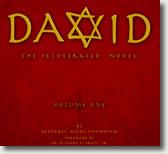Grief and Lament
 Saul and Jonathan, beloved and lovely! In life and in death they were not divided; they were swifter than eagles, they were stronger than lions. O daughters of Israel, weep over Saul, who clothed you with crimson, in luxury, who put ornaments of gold on your apparel.—2 Samuel 1:23-24
Saul and Jonathan, beloved and lovely! In life and in death they were not divided; they were swifter than eagles, they were stronger than lions. O daughters of Israel, weep over Saul, who clothed you with crimson, in luxury, who put ornaments of gold on your apparel.—2 Samuel 1:23-24
With the second book of Samuel, David's role changes. The fugitive who spent years running from King Saul and is forced to take refuge in enemy territory becomes a recognized leader of Israel. David's ascension to power comes with Saul's death. As Samuel prophesied, Saul is struck down on the battlefield along with his son Jonathan, David's beloved friend. Yet David, who has been fighting a battle of his own, is unaware of what's transpired. An Amalekite tells him of Saul's dying, claiming to have taken part in the final demise of David's longtime tormentor. David's reaction is not what the miscalculating Amalekite expected. Instead of reacting with joy and triumph, David is utterly grief-stricken by the news.
We too might be surprised by David’s reaction to the fall of one who has made his life a misery. Yet then we remember that David spared Saul’s life on two separate occasions. He could not bring himself to harm God’s anointed. Despite the years of hardship, Saul was David’s king, father of the man David felt closer to than a brother. Perhaps it is the realization that they will never be reconciled that tears David’s heart with grief. Perhaps he mourns chiefly for Jonathan, or perhaps he grieves the defeat of the Israelite army.
We cannot know its chief cause, but David's sorrow is undeniable. He gives voice to his deep anguish in a poetic lamentation. According to the Harper Collins Study Bible, the lamentation most probably was authored by David himself. It is a wrenching cry that puts into words the loss of Saul and Jonathan for all Israel. For these public figures, David insists on public grief as the most appropriate way to acknowledge the promise lost and honor the ensuing pain. The poem conveys the sorrow of a nation that must be expressed in order to move toward healing.
It is with this lamentation that we end our coverage of David’s life, at least for now. Though we leave David wrenched by grief, his story is far from over. He will rise to rule all Israel, becoming the most celebrated king of the ancient world. Perhaps our conclusion here is most fitting because we end with a poem. In his poems David shows us his humanness, his vulnerability, his doubts and his faith. Though he realized great power and prestige, political stature is not the trait that most of us relate to in David's character. Rather, it is in his humanity that we find our connection. The many psalms David penned, and those ascribed to his authorship, capture human emotion as poignantly and palpably as any literature ever written.
In the end David lived a life of glory and shame, great deeds and deep failings, and through it all ran faith, like marrow in the bone. His psalms, written both with joy and in despair, bear witness to a God who remains steadfast and present. Even thousands of years later, David’s story is rich with lessons we can use, and his faith serves as encouragement to us to watch for God in all things, to look where God is least expected.
For everything there is a season, and a time for every matter under heaven: a time to be born, and a time to die; a time to plant, and a time to pluck up what is planted; a time to kill, and a time to heal; a time to break down, and a time to build up; a time to weep, and a time to laugh; a time to mourn, and a time to dance. —Ecclesiastes 3:1-4
I will not say, Do not weep, for not all tears are an evil. — J.R.R. Tolkien
There are times and conditions that we experience as unmitigated sadness. There are circumstances that are hopeless.
[Psalm 88] stands to affirm that such expressions of grief are legitimate. It is not faithless to cry out in helpless and hopeless anguish. It is not wrong to place responsibility for such wrongs at the feet of God. And you don't have to appease God with some word of piety, hope or praise.
We can be completely honest toward God with our thoughts and feelings. And God is big enough to take it all. God won't punish us for being hurt and angry, even hurt and angry at God.
In fact, only God can take this kind of suffering. To give it to God might restrain us from internalizing our angry grief into a depression or externalizing by lashing out at someone else. Only God is great enough to take this kind of misery and not compound it.
—Lowell Grisham
Will I be punished if I am angry at God because I feel miserable and alone?
Blessed are those who mourn, for they will be comforted. —Matthew 5:4
When all of our own hopes have died, we still have this faith that seeks nothing for itself—not wisdom, not spiritual power, not rescue from suffering. "Success" is not in its vocabulary. This faith seeks nothing but God, to whom it is willing to surrender everything—up to and including its own cherished beliefs about who God is and how God should act. This faith is willing to sell all that it owns and bet the farm on one chance for union with God. If God plays hard to get, then this faith will never stop its wooing.
—Barbara Brown Taylor
My God, My God, why have you forsaken me?
Give sorrow words: the grief that does not speak
Whispers the o'er-fraught heart and bids it break.
—William Shakespeare
Macbeth
My lyre is turned to mourning, and my pipe to the voice of those who weep. —Job 30:31

